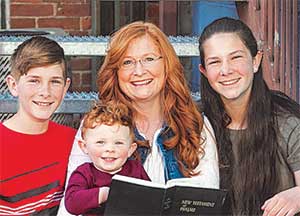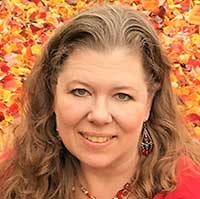January 29, 2025 – When Math Gets Hard


When Math Gets Hard
January 29, 2025
Deborah Wuehler
What If I Am Not Good at Math?
Adam and Dianne Riveiro
Calculus Ain’t For Everyone
Hal and Melanie Young
When Math Gets Hard
Carolyn VanGorkum
Finding What Works for Your Student

Mercy Every Minute
Deborah Wuehler, TOS Senior Editor
What If I Am Not Good at Math?
Have you ever wondered, “I don’t love math, so how can I homeschool my child?” Believe me, you can do this! There are so many ways and means of teaching that even if you are not good at math, your child can be good at math! Math is my weak area. I can make it through teaching junior high math, but I obtain all the help I can to teach high school. I have found tons of help in the pages of The Old Schoolhouse Magazine.
You can learn along with your children the history of scientists and their mathematical discoveries. You can show them there are math uses in everyday life. You can even try teaching math through questions and conversations.
It doesn’t matter if you love it or hate it, there is always help. Here are ten tips for teaching math, and believe it or not, you can hate it and still be good at it.
Take the frustration out of math by using games and money and shopping trips, and other hands-on math activities, as well as some tangible tools for teens to have success in math. Math can be multisensory, hands-on, and delicious.
Yes, there will be hard math days. But, the real joy of it all is that we have our own children in our own homes, under our own care. Math can be done on comfy couches and outside in forts. No fuzzy math here. No common core math to struggle with. Children are free to go as far and fast as they can in math. Or, can take it more slowly. We are free to speak about the mighty wonders of God when we sit in the house, when we walk by the way, when we lie down, and when we rise up (Deut. 6:4-7). Our children are free to sing praises in the living room and dance in the dining room; free to laugh in the hallways and pray in the bedrooms; they are free to be Home. Where They Belong.
~Deborah
Find math products reviewed here: Product Reviews – The Old Schoolhouse®
Listen to our podcast: Episode 1: When Math Brings Tears – The Old Schoolhouse®
JANUARY SALE! Get Math Mammoth digital versions at 30% off! Comprehensive – open’n’go – affordable. Full curriculum, supplemental review workbooks, topical units available.

Adam and Dianne Riveiro
Calculus Ain’t For Everyone
Comedian Nate Bargatze once ironically said that he believes “reading is the key to smart.” In a similar vein, I’d say, “Calculus ain’t for everyone.” As a student, I did really well with math as long as the book said “Math” on the cover. Once we moved into the more specific disciplines like algebra and geometry, I struggled a great deal more. Calc? Forget it!
Unfortunately, as our society has changed, public education’s approach to mathematics has remained stubbornly the same. But here’s the good news: we aren’t beholden to what public education thinks about the types of math our children need to learn. While I think every child should have a basic grasp of the fundamentals of algebra and geometry, I don’t feel that you’re betraying your child’s education by ignoring some of the more complex math disciplines, especially depending on what your child wants to do when they grow up. In fact, I’d encourage you to lean heavily into . . .
- Consumer Math: While balancing a checkbook may be a thing of the past, most young people don’t understand budgeting, spending, taxes, or investing.
- Business Math: In my humble opinion, more kids would benefit from learning how to read a profit and loss statement than memorizing advanced trigonometry formulas.
- Entrepreneurship: While related to business math, teaching a child the ins and outs of starting a small business is an excellent opportunity to teach principles of accounting and financial management.
- Home Economics: No, I’m not crazy (well, maybe a little, but not about this). Home economics involves a lot of mathematics and both young men and women would profit greatly from understanding how math can help them in real-life household settings.
In the end, if your child thinks sine is a sin and tan is something they get during the summer, it’s ok! Allow yourself the freedom to make your child’s math class a true‑life tutorial, not an instrument of futility.
-Adam
About the author
Pastor Adam and Dianne Riveiro live in Easton, Massachusetts, where Adam leads Liberty Baptist Church. They’re the authors of several books, including Hope from Our Heart to Yours: A 30-Day Devotional Journey for Special Needs Families, available from their family’s publishing label at www.readyscribepublications.com. They have four children: Bethany, Kaylee, AJ, and Peyton. They’re passionate about helping their fellow special needs families find joy and contentment in Christ.
Join Kathy Hutto on YouTube: Christian content creator sharing devotions, FREE homeschool resources, and inspiring Bible lessons for kids & families at YouTube@kathyhutto.

Hal and Melanie Young
When Math Gets Hard
When math gets hard, sometimes there is more going on than we think.
Years ago, one of our boys was really struggling with third grade math. We needed to move into multiplication, but he couldn’t consistently add single digit numbers! I was in a panic. I planned to spend the summer really drilling on the basics, but we never got to it. When fall came, I told him we needed to get a different curriculum (because I planned to repeat that third grade material). To my surprise, he found the fourth grade book, began using it on his own, and within a few weeks he was multiplying three- and four-digit numbers!
What happened? During the summer he had become developmentally ready for that level of math. You might find the same issue if a child is ahead in basic math, but struggles when he hits algebra. Or, your child is eleven and suddenly can’t remember the math you taught him last year. Puberty causes brain remodeling. Your student is foggy while it’s happening, but at the end, academics, especially abstract math, are a lot easier.
Sometimes, a child has learning differences. Some children are strongly right-brained and struggle with switching sides of the brain to do academic tasks, resulting in struggles with reading, writing, or math. One of our children found math was easier when we used colored gel pens instead of pencils. Color is seen on the right side of the brain and helps her to focus. Using story, like word problems, in illustrating math concepts really helps, too. Story and emotion are right brain things! It can also help to have them write big (like on a large white board or sheets of butcher paper) because getting big muscle groups involved can make your brain work better, especially for boys. Even standing up and using a countertop for a desk can change things.
When math gets hard, don’t assume it’s laziness or orneriness. Sometimes they need more time or a different way of learning. Don’t be afraid to change things up!
Download this free short course, Bright Kids Who Struggle to help you figure out what’s going on!
Your friends,
Hal & Melanie Young
About the author
Hal and Melanie Young have been homeschooling almost as long as they’ve been married, and they’re still happy with both decisions! They wrote My Beloved and My Friend: How to Be Married to Your Best Friend Without Changing Spouses to encourage their young adults – find out more at raisingrealmen.com.
VISUAL MANNA IS OFFERING ART ONLINE FOR ALL AGES, CAMPS, ART INTENSIVES AND INTERNSHIPS. https://visualmanna.company.site/?category=0
CONTACT VISUALMANNA@GMAIL.COM FOR MORE INFORMATION.

Carolyn VanGorkom
Finding What Works for Your Student
Both my son and daughter had learning setbacks with math. To memorize her basic math facts, my daughter needed fun stories and silly songs. Eventually we had to move on to harder skills. By using a times table, she slowly learned the basic facts as she went.
My son did okay with the facts, but hit a snag in high school. Algebra 1 was painful, and geometry was worse. He told me almost every day, “I’m never going to use any of this anyway.” We had to try multiple curricula for each subject until we finally found ones that let him squeak by with the basics.
I can almost guarantee that neither of them will take another math course—they hated it that much. As a former credentialled math teacher, that breaks my heart a little, but it does prove that math aptitude isn’t passed on genetically!
As a teacher, and as a mom in the trenches, there are several options I can suggest if your child struggles with math.
Elementary
- Hands-On Math: Learn fractions while cooking. Use a life-size number line to practice skip counting. Use connecting blocks as singles or stacks of ten for place value.
- Puzzles and Games: Switch up the drill and practice for some fun worksheets.
Middle School
- Switch curricula as necessary—even mid-year.
- Break concepts down into smaller steps.
High School
- Pick the right curriculum: Video, text, or hands-on based.
- Look it up: Search the internet with the name of the particular skill your child is finding challenging (found in the textbook) and your specific question about it.
- Phone a friend: See if there are any math geeks in your local homeschool community that would be willing to help your child.
- Don’t be afraid of AI: More resources are coming online daily that offer math tutoring and solutions help. Used honestly and with permission, they can be useful aids.
About the author
Carolyn VanGorkom lives in Northern California with her worship-pastor husband and two children, both homeschool graduates. Before homeschooling, she was a credentialed math teacher. She joined Schoolhouse Teachers as a lesson designer and quality assurance manager. She is currently the Director. Her other interests include music, writing, and history.
A division of The Old Schoolhouse®
SchoolhouseTeachers.com Corner
Did you know?
Every class is INCLUDED for ultimate members!
No limits.
Do you have a student struggling with decimals? On the other hand, do you have a student who loves decimals? Either way, our Decimal Workshop course is a great help to homeschooling families. These math lessons are designed to help parents teach their students through examples and practice problems. With worksheets, quizzes, and answer keys, this course can be completed at the student’s own pace and doubles as a great review for elementary math.
Homeschool-Store.com Merch


Homeschool math does not need to lead to tears. In this podcast episode, Heather interviews Nadim of CTCMath, who shares how this popular online math program can do the heavy lifting for the homeschool mom, provide online and offline support, and be customized for each child.
There had to be a way to help more students achieve success in math. Unlock Math meets students where they are, fills in any gaps they might have, and is useful for struggling to gifted students, instilling a lifelong love for math. (Find this and other articles at HomeschoolApp.com.)
Share this newsletter with a friend, and be sure to let those CONSIDERING homeschooling know about the enormous FREE info-pack which awaits them here: www.TryHomeschooling.com.
| We Want Your Feedback! |
| If you liked today’s Homeschool Minute, please email the editors and tell us what part you liked most. It’s a huge blessing to receive feedback! Please add publisher@theoldschoolhouse.com to your email contacts so that our emails to you don’t land in spam. |
DISCLAIMER: The Old Schoolhouse® and its staff do not necessarily endorse or agree with the articles, images, advertisements, or other content appearing in The Homeschool Minute, on any linked website, or otherwise. The views and opinions or other matters expressed in this newsletter are not necessarily those of the publishers, editors, staff, contractors, associates, or other affiliates of The Old Schoolhouse®







